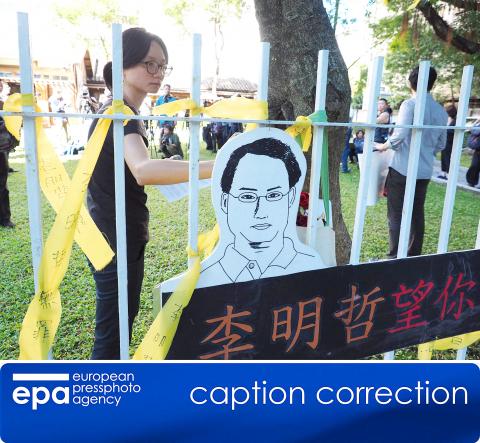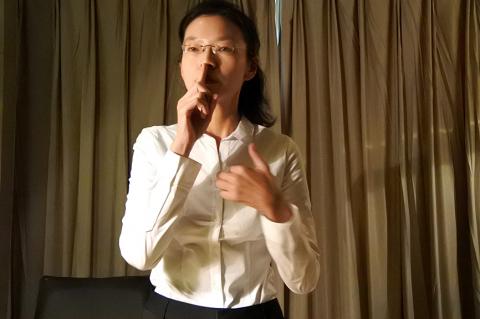A Chinese court yesterday sentenced Taiwanese human rights advocate Lee Ming-che (李明哲) to five years in prison for holding online political lectures and helping the families of jailed dissidents in a conviction demonstrating how Beijing’s harshest crackdown on human rights in decades has extended beyond China.
Lee’s trial was also China’s first known criminal prosecution of a nonprofit worker since Beijing passed a law in April last year tightening controls over foreign non-governmental organizations.
Lee went missing on March 19 after entering Zhuhai, Guang Province, from Macau. China did not announce his arrest until 10 days later.

Photo: David Chang, EPA
The Yueyang City Intermediate People’s Court in Hunan Province handed down the sentence after finding Lee guilty of subversion of state power.
Lee had confessed during his trial in September, which his wife, Lee Ching-yu (李凈瑜), dismissed as “a political show.”
His codefendant, Chinese national Peng Yuhua (彭宇華), was sentenced to seven years in prison.

Photo: CNA
Peng had also pleaded guilty, saying he had founded an organization called Palm Flower Co to pressure China to accept a multiparty political system and that Lee Ming-che was his deputy in charge of education.
Subversion of state power is a vaguely defined charge often used by Chinese authorities to muzzle dissent and imprison critics.
The court said both men said they would not appeal.
Lee Ching-yu, who attended the sentencing, said in a statement issued through her supporters: “A price must be paid in the pursuit of an ideal.”
“Striving for human rights for the underprivileged is a necessary dedication to promoting the progress of human civilization,” she said.
Supporters say that since the trial ended, Lee Ching-yu has been prevented from leaving her hotel room or meeting with anyone.
“Lee Ming-che took the risk despite knowing the dangers,” she said, adding that she was proud of him.
She said she was allowed to meet her husband for only three minutes, and he told her, through hand gestures, that he was wearing a covert listening device.
She said he told her to buy books for him, while she told him that the “free world” would continue to help in his rescue.
Former Democratic Progressive Party legislator Wang Li-ping (王麗萍), who on Monday accompanied Lee Ching-yu to Yueyang, but was deported, told a news conference in Taipei that China had monopolized jurisdiction over the case, despite the existence of cross-strait judicial agreements.
The case is a blatant example of Beijing seeking to extend its power while the Taiwanese government has acted passively, Taiwan Association of University Professors president Lin Hsiu-hsin (林秀幸) said.
Lee Ming-che was convicted for his online comments, a verdict that has grave implications for Taiwanese, Lin said.
Taiwanese have to either “comply with Chinese laws in Taiwan” or stay away from China, Lin said.
Judicial Reform Foundation executive director Kao Jung-chih (高榮志) said the trial ran counter to the rule of law, because Lee Ming-che’s lawyer gave up defending him, the right to review evidence and seek an appeal.
“The case does not concern Lee Ming-che alone, but all of us,” Kao said.
Taiwan Association for Human Rights secretary-general Chiu Ee-ling (邱伊翎) said they would continue to seek international assistance and present an account of the case at a convention of the UN Human Rights Council’s Working Group on Enforced or Involuntary Disappearances in Brussels in February, as China has not disclosed where Lee is being held.
Lee’s sentence was “incredibly harsh,” given the accusations against him and the lack of evidence, said Maya Wang (王松蓮), Human Rights Watch’s Hong Kong-based researcher.
“It’s probably designed as a warning to activists based outside China, particularly those in Hong Kong and Taiwan,” as Chinese President Xi Jinping’s ( (習近平) crackdown on dissent radiates beyond its borders, Wang said in an e-mail.
Amnesty International said Lee Ming-che was a victim of a politically motivated prosecution and that the evidence against him was not credible.
“He is the latest to suffer under the Chinese authorities’ relentless attack against human rights and democracy activists,” Roseann Rife, the group’s East Asia research director, said in a statement.

AGING: As of last month, people aged 65 or older accounted for 20.06 percent of the total population and the number of couples who got married fell by 18,685 from 2024 Taiwan has surpassed South Korea as the country least willing to have children, with an annual crude birthrate of 4.62 per 1,000 people, Ministry of the Interior data showed yesterday. The nation was previously ranked the second-lowest country in terms of total fertility rate, or the average number of children a woman has in her lifetime. However, South Korea’s fertility rate began to recover from 2023, with total fertility rate rising from 0.72 and estimated to reach 0.82 to 0.85 by last year, and the crude birthrate projected at 6.7 per 1,000 people. Japan’s crude birthrate was projected to fall below six,

US President Donald Trump in an interview with the New York Times published on Thursday said that “it’s up to” Chinese President Xi Jinping (習近平) what China does on Taiwan, but that he would be “very unhappy” with a change in the “status quo.” “He [Xi] considers it to be a part of China, and that’s up to him what he’s going to be doing, but I’ve expressed to him that I would be very unhappy if he did that, and I don’t think he’ll do that. I hope he doesn’t do that,” Trump said. Trump made the comments in the context

SELF-DEFENSE: Tokyo has accelerated its spending goal and its defense minister said the nation needs to discuss whether it should develop nuclear-powered submarines China is ramping up objections to what it sees as Japan’s desire to acquire nuclear weapons, despite Tokyo’s longstanding renunciation of such arms, deepening another fissure in the two neighbors’ increasingly tense ties. In what appears to be a concerted effort, China’s foreign and defense ministries issued statements on Thursday condemning alleged remilitarism efforts by Tokyo. The remarks came as two of the country’s top think tanks jointly issued a 29-page report framing actions by “right-wing forces” in Japan as posing a “serious threat” to world peace. While that report did not define “right-wing forces,” the Chinese Ministry of Foreign Affairs was

PREPAREDNESS: Given the difficulty of importing ammunition during wartime, the Ministry of National Defense said it would prioritize ‘coproduction’ partnerships A newly formed unit of the Marine Corps tasked with land-based security operations has recently replaced its aging, domestically produced rifles with more advanced, US-made M4A1 rifles, a source said yesterday. The unnamed source familiar with the matter said the First Security Battalion of the Marine Corps’ Air Defense and Base Guard Group has replaced its older T65K2 rifles, which have been in service since the late 1980s, with the newly received M4A1s. The source did not say exactly when the upgrade took place or how many M4A1s were issued to the battalion. The confirmation came after Chinese-language media reported